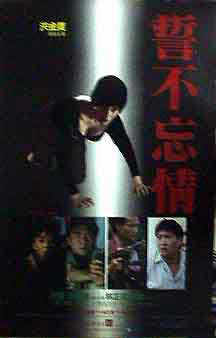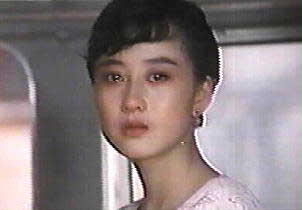Lover's Tear

Director: Jacob Cheung
Year: 1992
Rating: 8.0
With a cast that
includes Sammo Hung, Yukari Oshima, Lam Ching-Ying and Ngai Sing one might
expect that there would be a large amount of action, but for the most part
this film is a character driven story that weaves together a tense narrative
and a powerful love story. This film is in fact surprising in many
small wonderful ways – from the portrayal of the characters – in particular
the “bad guys” – to the path that the story takes to the final bittersweet
scene. The film explores the common HK themes of loyalty and honor – but
on many different levels and in a way that few films do. I found this to
be a terrifically involving film – beautifully directed by Jacob Cheung –
and with two performances (in which hardly a word is spoken) that will resonate
with me for a long time.

Jacob Cheung (The Intimates, Cageman) takes what could have easily been
standard cops and crooks fodder and turns it into a gem. The pacing of the
film is nearly flawless – and there are a number of noirishly suspenseful
scenes that reminded me of Hitchcock in his British films. There is certainly
a 39 Steps flavor to the film – both stylistically and story wise. Cheung
– who is considered more of an artistic director than a commercial one –
brings many of these artistic elements – imaginative lighting, moody music,
seamless editing – to bear on this "commercial" film and turns it into something
special.

Two HK cops - Ngai Sing and his older partner Inspector Mai – come
to Shenzhen to meet with the Mainland authorities regarding the murder of
one of their colleagues. Commissioner Kung – Sammo – tells them that he suspects
that a criminal named Lin Wei (Tsui Kam-Kong) is the guilty party and that
he is being sought after. Against orders, Sing goes off on his own to investigate
and soon circumstances come about so that he is wrongly accused of shooting
– Yukari – a Mainland cop. He is able to escape though and is on the run handcuffed
to the mistress of Lin Wei – Nina Li – the only person who can prove that
he is innocent. Chasing after them are Lin Wei and his gang, the Mainland
cops and Inspector Mai – but the two find temporary sanctuary at Nina’s rural
home with her father Wu Ma.

The film changes mood and tempo here as it takes on a lyrical nature as
the two slowly develop an unspoken affection for one another. Sing soon learns
of her story from Wu Ma. She was forced into prostitution in HK and Lin Wei
pulled her out of the depths of that life and gave her a new start. She feels
overwhelmingly obligated to him and no matter what Sing says about him, and
no matter what her feelings are for Sing – she could never hurt him.

Nina Li is the heart and soul of this film. Her performance radiates a quiet
passion and complexity. Her character is deaf and nearly mute – but she is
able to convey enormous emotions – love, guilt, compassion, heartbreak – with
hardly a word – only using her eyes and body language for the most part.

What also really makes the film interesting is how the bad guys are portrayed.
Lin Wei is a smuggler and a killer – but a professional and he is truly in
love with Nina – worships her – and has done everything he could to make her
life better. The other performance that I enjoyed so much is from Lam Ching-Ying.
He works for Wei, but is also responsible for looking after Nina. He too
is deaf and the two of them are connected at a level that goes beyond love
and friendship – he would do anything to protect her or make her happy –
even betray the trust of Wei. When he does this though it breaks his heart.
He comes across as incredibly tough and thus his feelings for Li are all the
more touching.

Finally Sammo and the cops have set up a trap for Wei – with Nina as the
bait. Though Wei knows it is a trap, he has to go because her life might be
in danger – but he turns to his men and says “this is personal – no one has
to come with me. I will never hold it against you”. All of his men immediately
pick up their guns and follow him into a near certain death situation – as
does Lam Ching-Ying. It is a powerful moment.
This was a compelling film – and in some
ways a difficult one. The sense of humanity and complexity that Cheung gives
to all of his characters (even the minor ones) makes it almost impossible
to make judgements, to take sides. But in a story like this, someone has
to live and someone has to die – and the viewer will be left a bit sad no
matter how the fates decide it.
My rating for this film: 8.0









